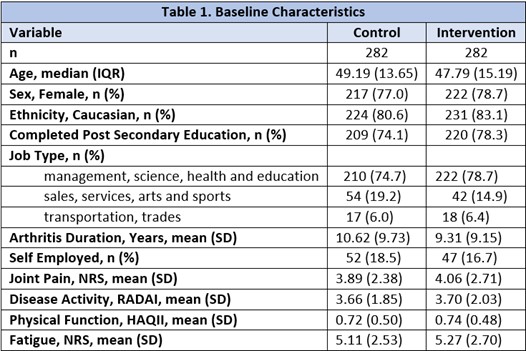Session Information
Date: Tuesday, November 9, 2021
Title: Abstracts: Epidemiology & Public Health II: Inflammatory Arthritis (1923–1926)
Session Type: Abstract Session
Session Time: 4:15PM-4:30PM
Background/Purpose: Despite advances in treatment, absenteeism remains a major problem for workers living with inflammatory arthritis (IA), leading to reduced income and quality of life. Yet, health services addressing employment needs of people with arthritis are lacking. We evaluated the effectiveness of the Making-it-WorkTM (MIW), an online program developed to help people with IA deal with employment issues, at preventing days missed from work and work interruptions.
Methods: A multi-center RCT evaluated the effectiveness of MIW at improving absenteeism over two years. Participants were recruited from rheumatologist practices, consumer organizations and arthritis programs, in three provinces. Eligibility criteria included: diagnosis of IA, being employed, age 18-59, and concerned about ability to work. Participants were randomized 1:1 to MIW or usual care plus printed material on workplace tips. MIW consists of five online self-learning modules and group meetings, and individual vocational counselling and ergonomic assessments. Questionnaires were administered every 6 months. Outcomes were 1) number of sick days (occasional days missed from work and sick leaves shorter than 2 months duration), calculated as a rate per 100 workable days; 2) work interruptions greater than 2 months duration, calculated per 100 days of follow-up, and 3) the combined outcome ( sum of sick days taken and work interruptions of any duration, calculated per 100 days of follow-up. Intention-to-treat analysis using Beta-binomial logistic regression models were used to evaluate the intervention effects on the three absenteeism outcomes, in separate analyses, accounting for the potential overdispersion in binomial outcomes. Odds ratios (OR) representing the intervention’s effect on the daily risk of each absenteeism outcome, adjusting for baseline characteristics [age, sex, education, ethnicity, job type, RA duration, pain, disease activity (RADAI), fatigue, and physical function (HAQII)], 95% confidence intervals and Wald-tests were computed using robust standard errors accounting for potential model mis-specifications. Analyses were conducted using STATA 16.
Results: A total of 564 participants were recruited, with 85% completing 2-year follow-up. Baseline characteristics were similar between groups (Table 1). Mean (SD) number of sick days were 2.7 (4.6) and 2.3 (4.3) per 100 workable days, for controls and MIW, respectively; and mean (SD) number of days of work interruptions were 10.5 (22) and 8.8 (21.2) per 100 days of follow-up, respectively. The intervention group had a 21% lower odds of taking sick days from work (p=0.028), a 30% lower odds of work interruptions (p=0.064), and a 26% lower odds of the combined outcome (sick days and work interruptions) (p=0.004) (Table 2).
Conclusion: Results of the RCT reveal that the program was effective at improving absenteeism by decreasing the odds of sick days, and work interruptions, although the latter was of borderline statistical significance. Effectiveness at preventing long-term work disability will be assessed at 5 years. This program fills one of the most important unmet needs for people with inflammatory arthritis.
 Table 1. Baseline Characteristics
Table 1. Baseline Characteristics
 able 2. Beta binomial logistic regression model estimating the effect of the intervention on absenteeism
able 2. Beta binomial logistic regression model estimating the effect of the intervention on absenteeism
To cite this abstract in AMA style:
Luquini A, Zheng Y, Xie H, Backman C, Rogers P, Kwok A, Knight A, Gignac M, Mosher D, Li L, Esdaile J, Thorne C, Lacaille D. Effectiveness of the Making It Work™ Program at Improving Absenteeism in Workers with Inflammatory Arthritis – Results of a Randomized Controlled Trial [abstract]. Arthritis Rheumatol. 2021; 73 (suppl 9). https://acrabstracts.org/abstract/effectiveness-of-the-making-it-work-program-at-improving-absenteeism-in-workers-with-inflammatory-arthritis-results-of-a-randomized-controlled-trial/. Accessed .« Back to ACR Convergence 2021
ACR Meeting Abstracts - https://acrabstracts.org/abstract/effectiveness-of-the-making-it-work-program-at-improving-absenteeism-in-workers-with-inflammatory-arthritis-results-of-a-randomized-controlled-trial/
